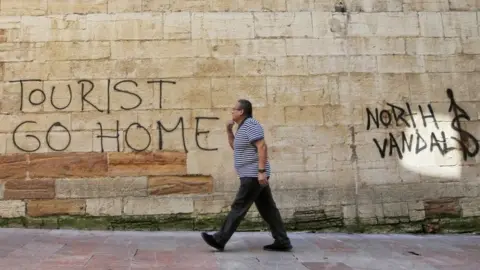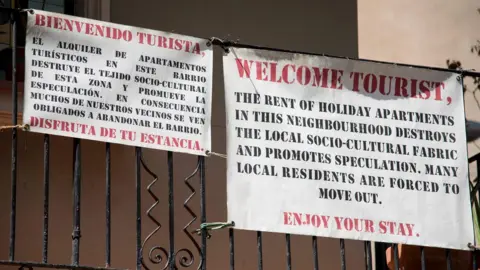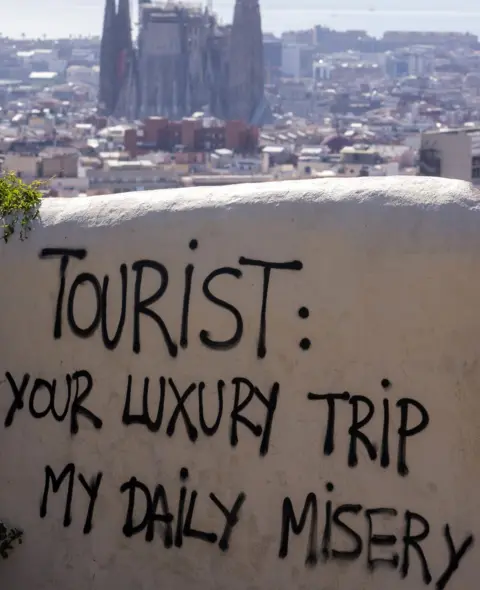Are tourists still welcome after protests?
 EPA
EPAAfter a wave of anti-tourism protests, the Spanish city of Barcelona plans a crackdown on illegal holiday rentals.
The move comes after signs popped up in the city telling tourists that local rents are now unaffordable because of demand for holiday accommodation.
People have to be licensed before they can let out their properties for short stays, but there are still an estimated 5,000 to 6,000 illegal holiday flats.
Anti-tourist feelings are running high and some have had eggs thrown at them.
Such campaigns are now being seen elsewhere in Spain, the world's third-biggest holiday destination, including the Basque city of San Sebastian, where an anti-tourism march was being held on Thursday.
The tourism industry is concerned at the potential global effect.
"Tourism is of immense economic benefit to European destinations and has become even more important in recent years," says a spokesperson for Abta, the UK travel agents' association.
"Most people appreciate these benefits and accept that at certain times of year, they will have to share their cities with significant numbers of tourists from around the world."
'Manage numbers'
Abta, perhaps unsurprisingly, blames the problem on the rise of online services such as Airbnb, which threaten its members' traditional business model while promoting a huge expansion in illegal tourist accommodation in cities such as Barcelona.
 AFP
AFP"The rapid growth of the peer-to-peer economy in recent years has led to significant increases in visitors to some cities, but due to the lack of licensing and regulation in this sector, it is impossible to fully understand tourism numbers," it says.
"We need mechanisms in place to manage numbers in crowded destinations, for the benefit of holidaymakers, destination residents and the travel industry. Logically, these measures would need to take account of both hotel visitors and peer-to-peer accommodation users."
Abta may have a point, though. According to some estimates, as many as 40% of Barcelona's tourist apartments are being rented out without the authorities' permission, making it much harder for local people to find affordable accommodation.
For now, tour guide operators and other local businesses say privately that the anti-tourist backlash has made little difference to the influx of visitors.
And the Spanish government must be hoping they are right.
More than 75 million tourists visited the country last year, and the number is expected to hit a record 83 million in 2017.
With Spain still recovering from its crippling economic crisis, tourism is more important to national well-being than ever before.
'Cookie-cutter' tourism
Lucy Fuggle, head of content at TrekkSoft, which provides logistics and software to travel firms, sees the discontent as a sign that tourism needs to change. "The backlash is concerning, but more so for the sentiment than the economic impact," she says.
 EPA
EPA"Tourism will continue - there's no doubt about that - but we see some changes that need to happen, such as improved regulations and better distribution of visitors across cities.
"In our work with tour and activity suppliers and tourism boards, we've noticed that visitors are increasingly seeking unique experiences in less 'typical' destinations," Ms Fuggle says.
"It's a step away from the cookie-cutter package trip, and if more visitors turn to this, we could see less dense distribution in struggling cities such as Barcelona and Venice. It comes at a greater cost to the consumer than budget city breaks, however."
Future fears
It's probably too late for the protesters to have much impact on this year's tourism numbers.
The surge in visitor numbers is being fuelled by powerful global economic forces. As the appeal of other once-popular destinations such as Tunisia, Turkey and Egypt is waning because of security concerns, Spain looks even more attractive as a haven for sun-worshippers.
But the impact of the anti-tourist campaign could well be felt in 2018 and beyond.
The Catalan Tourist Board is a regular exhibitor at London's World Travel Market tourism fair, held every November, along with 11 other Spanish travel organisations.
After some bumper years, the Spanish tourism industry will have to work hard to ensure that it too does not fall out of fashion.
